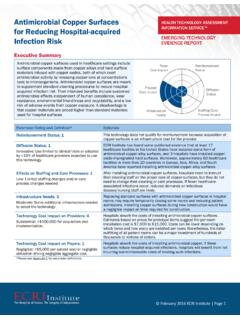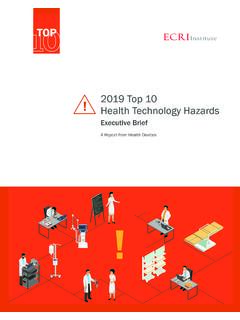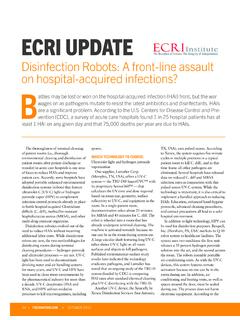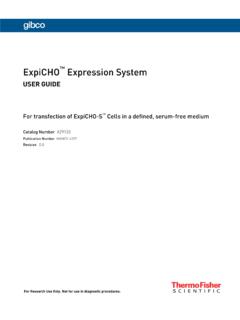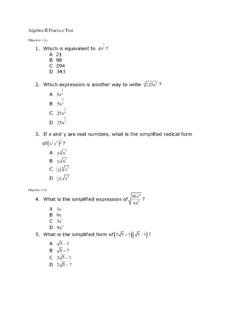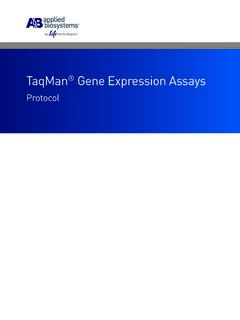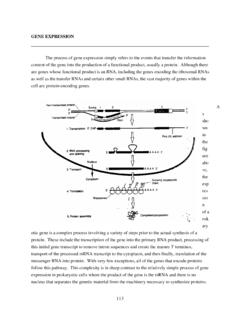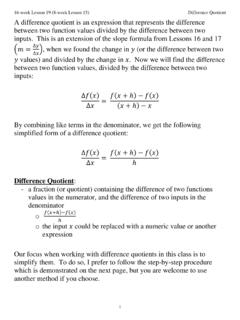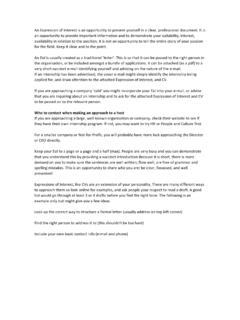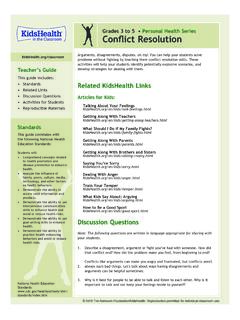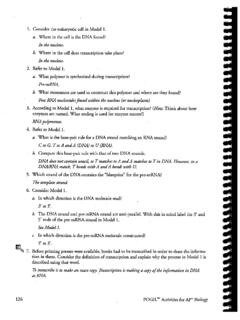Transcription of Gene Expression Test (AlloMap) for Monitoring Heart ...
1 Gene Expression Test (AlloMap) for Monitoring Heart Transplant Rejection November 2015 ECRI Institute | Page 1 Executive Summary AlloMap (CareDx, Inc.) is a noninvasive, blood-based gene- Expression test to aid identification of Heart transplant recipients with stable allograft function who have a low probability of moderate/severe acute cellular rejection at the time of testing. Clinicians use AlloMap in conjunction with standard clinical assessment to determine the need for further evaluation for acute cellular rejection using endomyocardial biopsy (EMB). The test is based on measurement of the Expression level of multiple genes associated with acute cellular rejection. AlloMap is intended to reduce the number of EMBs required during post-transplant surveillance.
2 Potential disadvantages of AlloMap include possible false test results. False-positive results could result in unnecessary EMBs and associated risks. False-negative results could delay an additional evaluation and treatment for Heart transplant rejection. Parameter Rating and Definition* Rationale Reimbursement Status: 3 Expanding: Medicare has no national coverage determination; 4 to 7 private payers have issued positive payment policies. Our searches of 11 representative, private, third-party payers that provide online medical coverage policies found 6 payers with a policy describing coverage with conditions, 3 payers that deny coverage, and 2 payers with no specific policy. About two-thirds of the Heart transplant population are covered for AlloMap.
3 The American Medical Association has assigned a specific Current Procedural Terminology code to describe AlloMap effective January 1, 2016. Cost Impact on Payers: 2 Small: Either >$500 to $2,000 per patient or limited utilization resulting in small aggregate cost to payers. The list price for a single AlloMap test is $3,600. Because healthcare centers rejection surveillance schedules vary, AlloMap testing for a single patient 6-months to 5-years post-transplant may cost from $25,200 to $57,600. In 2014, approximately 2,000 Heart transplants were performed in the United States; therefore, the aggregate cost to payers is low because the patient population is small. Utilization Status: 2 Low: Performed by only one or a small number of labs.
4 A small number of clinicians are prescribing the test or the patient population currently using the test is small. Since 2005, more than 75,000 AlloMap tests have been performed in the post-transplant care of more than 16,000 patients. According to CareDx, 110 of 130 transplant centers use AlloMap for Monitoring some of their Heart transplant patients. However, according to an online news source, AlloMap has captured 30% market share, and the overall patient population is small because the indication is relatively rare. *Please see Appendix C for parameter definitions. Gene Expression Test (AlloMap) for Monitoring Heart Transplant Rejection November 2015 ECRI Institute | Page 2 Evidence Summary of Selected Outcomes Patients less than one-year post-transplant have a significantly higher risk of rejection than those who are more than one-year post transplant.
5 For this reason, we report outcomes that may be affected by time post-transplant separately. Key Outcomes Assessed Evidence Base Conclusions GRADE-based Strength-of- evidence Rating* Mortality AlloMap vs. EMB: 1 RCT, patients 2- to 18-months post-transplant Inconclusive: No deaths occurred in either group** Very low AlloMap vs. EMB: 1 RCT, patients 1- to 5-years post-transplant Inconclusive: Too few patients assessed Very low Quality of life AlloMap vs. EMB: 2 RCTs Inconclusive: Inconsistent results Very low Sensitivity for detecting acute rejection (ISHLT Grade 2R) 1 diagnostic cohort study, patients <1-year post-transplant Inconclusive: Insufficient data reported to determine sensitivity Very low 1 diagnostic cohort study, patients >1-year post-transplant Inconclusive: Study has high risk of bias Very low Negative predictive value for the absence of acute rejection (ISHLT Grade <2R) 1 diagnostic cohort study, patients 2- to 6- months post-transplant Inconclusive.
6 Study has high risk of bias Very low 2 diagnostic cohort studies, patients >6- months post-transplant The negative predictive value ranges from ( ) to 100% using a cutoff threshold of 34 Low Biopsy-related adverse events AlloMap vs. EMB: 2 RCTs Inconclusive: Too few biopsy-related adverse events assessed Very low *Note: We grade strength of evidence based on the concepts and methods proposed by the GRADE working group. Please see Appendix A for details. **In this study, patients were enrolled an average of 50 53-days post-transplant, and outcomes were reported at 18-months post-transplant. In this study, the majority of patients (85%) enrolled >1 year post-transplant and outcomes were reported 2-years postrandomization. EMB: Endomyocardial biopsy ISHLT: International Society for Heart and Lung Transplantation NA: Not applicable RCT: Randomized controlled trial Gene Expression Test (AlloMap) for Monitoring Heart Transplant Rejection November 2015 ECRI Institute | Page i Table of Contents Overview.
7 1 Background/Disease .. 1 Genetic Test Description: AlloMap .. 2 Costs .. 3 Cost-effectiveness and Considerations .. 3 Reimbursement .. 3 Coverage .. 4 5 Payment .. 5 Regulatory Status .. 5 Clinical Guidelines and Standards .. 6 Evidence Reports Published by Other Health Technology Assessment Organizations .. 6 Evidence Review .. 7 Methods .. 7 Findings .. 8 Clinical Validity .. 8 Clinical Utility .. 9 Ongoing Clinical Trials .. 11 Discussion .. 11 Genetic Test Significance: Evidence-base Conclusions and ECRI Institute Opinion .. 12 References .. 13 Classifications .. 16 Search Strategy .. 17 Appendix A. Strength-of-evidence Assessment Methods .. 18 Risk-of-bias Assesment for Test Performance Studies .. 18 Appendix B. Results of Risk-of-bias and Strength-of-evidence Assessment.
8 20 Appendix C. Impact Ratings Definitions .. 23 Appendix D. Clinical Validity Data Published Before FDA Approval .. 24 Policy Statement .. 26 Gene Expression Test (AlloMap) for Monitoring Heart Transplant Rejection November 2015 ECRI Institute | Page ii Tables Table 1. Genes Included in the AlloMap Test 3 Table 2. Third-party Payer Policies .. 4 Table 3. Included Studies .. 8 Table 4. Clinical Validity for Patients >6-Months Post-transplant .. 9 Table 5. Test Results from Starling et al. for Patients, >12-Months Post-transplant, Threshold 34 .. 9 Table 6. Death, Rejection, and Graft Dysfunction from Kobashigawa et al.. 10 Table 7. Death, Rejection, and Graft Dysfunction from Pham et al.. 10 Gene Expression Test (AlloMap) for Monitoring Heart Transplant Rejection November 2015 ECRI Institute | Page 1 Overview For the purpose of ECRI Institute Genetic Test Reports, we use the 2008 definition of genetic test developed by the Department of Health and Human Services Secretary s Advisory Committee on Genetics, Health, and Society.
9 This definition states that a genetic or genomic test involves an analysis of human chromosomes, DNA, RNA, genes, and/or gene products ( , enzymes, other types of proteins), which are predominantly used to detect heritable or somatic mutations, genotypes, or phenotypes related to disease and health. Background/Disease Rejection After Heart Tranplantation Cardiac allograft rejection occurs when the Heart recipient s immune system recognizes the transplanted Heart as foreign and mounts an immune Rejection is classified as one of four types: hyperacute, acute cellular, antibody mediated, or Hyperacute rejection can occur within minutes to hours after surgery and is mediated by preexisting antibodies to donor Acute cellular rejection (ACR) is the most common form of allograph rejection (occurs in 30% to 50% of patients), and most cases occur in the first three to six months after ACR episodes are primarily mediated by recipients T cells, which cause inflammation and damage Heart Antibody-mediated rejection occurs when B lymphocytes produce antibodies directed against the transplanted Heart .
10 Antibody-mediated rejection occurs in 15% to 20% of Heart transplant Clinicians do not completely understand the cause of chronic rejection. Chronic rejection occurs years after transplantation and typically involves cardiac allograft vasculopathy (thickening and narrowing of the transplanted organ s arteries) and late graft To prevent rejection, Heart transplant recipients receive lifelong regimens of immunosuppressive drugs. Rejection surveillance and modification of the patient s drug regimen are critical to effective patient management. Physicians diagnose ACR on the basis of clinical data and the results of EMB and tissue histopathology and assessment. Although most patients with ACR are asymptomatic, patients can experience a range of symptoms, from arrhythmias to profound Heart failure.
